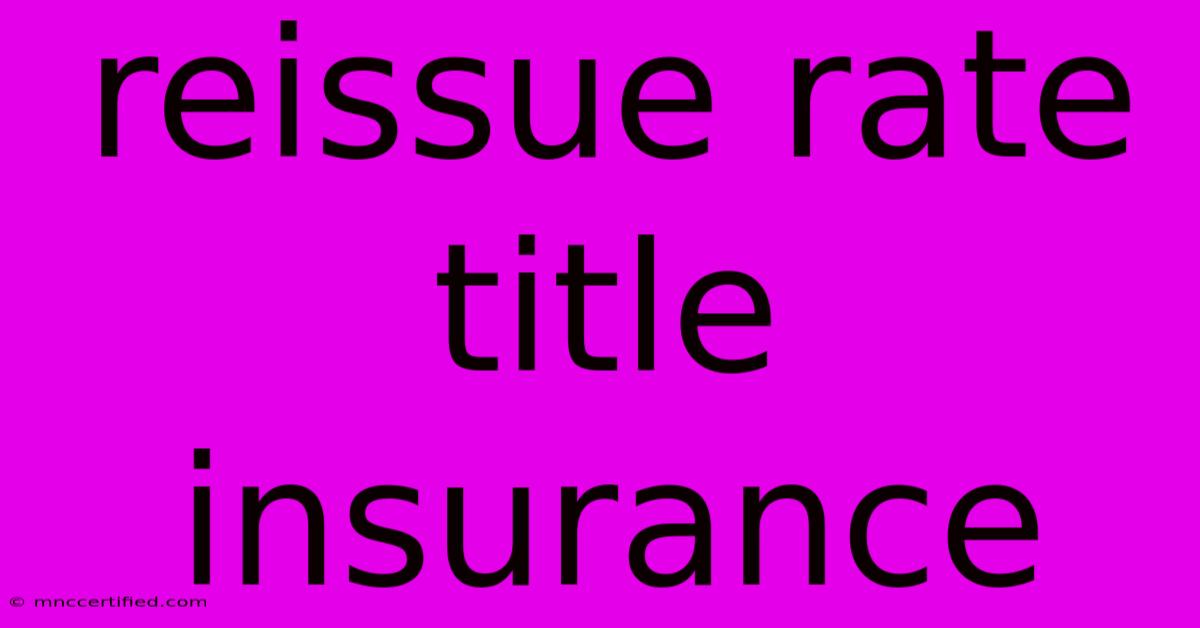Reissue Rate Title Insurance

Table of Contents
Reissue Rate Title Insurance: Understanding the Costs and Benefits
Title insurance is a crucial part of the real estate process, protecting buyers and lenders from financial losses due to title defects. But what happens when you need a new policy, perhaps due to a refinance or sale? This is where the reissue rate of title insurance comes into play. Understanding reissue rates is key to navigating the costs and benefits of this essential coverage.
What is a Reissue Rate for Title Insurance?
A reissue rate, also known as a reissue premium or a reduced rate, is a discounted premium charged when you need a new title insurance policy on the same property. Instead of paying the full original premium again, you pay a significantly lower reissue rate. This rate applies when the original policy owner requests a new policy for the same property, typically during a refinance or transfer of ownership.
Key situations triggering a reissue rate:
- Refinancing a mortgage: When you refinance your mortgage, you'll often need a new title insurance policy. The lender requires this to protect their interest in the property.
- Selling your property: When you sell your property, the buyer's lender will typically require a new owner's title insurance policy. If the seller's policy is still active and transferable, a reissue rate might apply.
- Transferring ownership (e.g., inheritance): In certain situations involving inheritance or other ownership transfers, a reissue rate may apply.
How Much Lower is the Reissue Rate?
The reissue rate is considerably lower than the initial premium. The exact percentage varies by state, title insurance company, and the specifics of the policy. However, you can typically expect a significant savings, often ranging from 25% to 75% of the original premium. This substantial reduction makes refinancing or selling less expensive.
Factors affecting the reissue rate:
- Original policy's age: Older policies may have a higher reissue rate than newer ones.
- State regulations: State laws influence the allowed reissue rates.
- Title insurance company policies: Each company has its own specific guidelines for calculating reissue rates.
- Type of policy (owner's or lender's): The type of policy (owner's or lender's) also influences the reissue rate.
Reissue Rate vs. Full Premium: A Cost Comparison
To illustrate the savings, let's consider an example. Suppose the original owner's title insurance premium was $1,000. A 50% reissue rate would mean a cost of only $500 for a new policy. This represents a substantial saving. Always compare the reissue rate to the cost of a full premium to understand the financial benefit.
Benefits of Understanding Reissue Rates
Understanding reissue rates is crucial for several reasons:
- Cost savings: The most obvious benefit is the significant cost savings compared to purchasing a new full-price policy.
- Streamlined process: Knowing about reissue rates can simplify the refinance or sale process.
- Budgeting: Predicting these costs helps with accurate budgeting for real estate transactions.
Finding Information on Reissue Rates
To find out the exact reissue rate for your situation, contact your title insurance company directly. They can provide a precise quote based on your specific circumstances and policy details. It's essential to compare quotes from multiple providers before making a decision.
Conclusion: Maximize Your Savings with Reissue Rates
Reissue rates for title insurance offer significant cost savings when you need a new policy on the same property. Understanding this aspect of title insurance empowers you to make informed decisions during refinancing, selling, or other ownership transfers, ensuring a smoother and more cost-effective real estate experience. By understanding the factors influencing reissue rates and actively seeking information from your title insurance provider, you can maximize your savings and minimize the financial burden associated with these transactions. Remember to compare quotes to find the best deal.

Thank you for visiting our website wich cover about Reissue Rate Title Insurance. We hope the information provided has been useful to you. Feel free to contact us if you have any questions or need further assistance. See you next time and dont miss to bookmark.
Featured Posts
-
Home Insurance No Inspection
Nov 30, 2024
-
Affleck Garner Reunite For Thanksgiving Charity
Nov 30, 2024
-
Commercial Insurance El Paso
Nov 30, 2024
-
Savannah Bond Full Hd Videos
Nov 30, 2024
-
Notre Dame Reopening A Symbol Of Hope
Nov 30, 2024